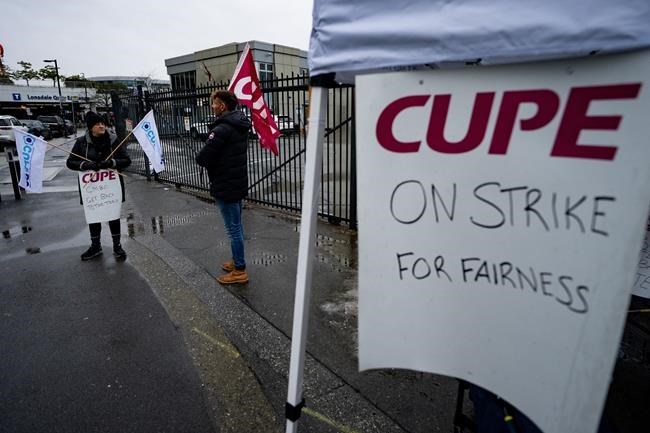VANCOUVER — Metro Vancouver bus and SeaBus services are set to resume in time for Wednesday morning's commute but the dispute that triggered a 48-hour strike by transit supervisors appears no closer to resolution.
Regional transport authority TransLink and the union representing more than 180 supervisors for Coast Mountain Bus Company both say the only certainty is that striking staff are set to return to work at 3 a.m.
The Canadian Union of Public Employees Local 4500 says in a written statement there are no updates on talks with Coast Mountain or next steps in the dispute the operator says has affected 300,000 daily users.
The union says an overtime ban will be back in place.
No hearing on the dispute between Coast Mountain and the union has been scheduled by the British Columbia Labour Relations Board as of Tuesday.
Talks between Coast Mountain and the union broke down on Sunday, resulting in a strike that halted 96 per cent of Metro Vancouver's bus services as well as SeaBus routes across Burrard Inlet.
Bus drivers are not on strike but are refusing to cross the transit supervisors' picket lines.
Unifor represents 5,100 transit workers with TransLink and Coast Mountain and said its members blamed TransLink for being used as "cannon fodder" in the dispute.
Gavin McGarrigle, Western Regional Director for Unifor, said members worried about the public blaming them for the stoppage.
He said Unifor members working for Coast Mountain were not paid during the stoppage.
"The fact of the matter is, Coast Mountain has not been able to reach a deal with 180 people," McGarrigle said. "And they somehow think the cost of that is worth impacting thousands of workers directly employed by the system and the public.
"And we say the obligation to the public is too big to allow these unaccountable executives to get away with that once again."
TransLink spokeswoman Tina Lovgreen said in a statement that "Unifor directed its members not to cross the picket line," and workers whose shifts were cut short when Coast Mountain recalled its buses early Monday ahead of the strike were paid for a full shift.Â
Coast Mountain said CUPE members were to blame for the stoppage because they were seeking bigger wage hikes than other supervisors at TransLink.
"If CUPE accepts the same wage increases Unifor already has, there would be no more labour action," Coast Mountain president Michael McDaniel said in a brief statement Tuesday.Â
"The strike would end immediately."
McDaniel said last week that CUPE 4500 was seeking a 25-per-cent wage increase, while CUPE 4500 said they wanted to close the wage gap with other TransLink supervisors.
The two sides were unable to reach a deal on Sunday, despite negotiations involving veteran mediator Vince Ready.
The strike resulted in a sharp spike in ride-hailing demand, and Uber and Lyft both said they capped surge pricing to keep fares from escalating further.
Uber spokeswoman Keerthana Rang said in a statement that the number of active Uber drivers rose more than 70 per cent on Monday between 7 a.m. and 8 a.m., but "it is not reasonable to expect Uber to fill the massive gap left by a transit strike."
Rang said Uber had offered incentives for drivers to complete more trips during times of higher demand, such as the transit strike.
CUPE spokesman Liam O'Neill on Monday said members weren't happy about the strike affecting the public, but Coast Mountain was trying to bully the union.
He said action would escalate if the bus company didn't come back to the table with a better offer.Â
McGill University associate professor and labour movement expert Barry Eidlin said the point of any strike is to compel the other side back to the negotiating table, and CUPE likely had a plan if there was no movement in talks with Coast Mountain soon.
"I think they clearly have a strategy, and they're not going to lay it out on the table all in public," Eidlin said.Â
"They have made clear that they will consider a more open-ended strike, and they've also petitioned to strike at the SkyTrain. So that would expand not just the length but the scope of the strike."
SkyTrain, West Coast Express, HandyDART and a handful of bus routes not operated by Coast Mountain were unaffected by the strike.
B.C. Labour Minister Harry Bains said Monday his ministry is considering appointing a special mediator in the dispute, although he also urged both sides to start talking again.
Eidlin said it was highly unlikely the NDP government would force CUPE 4500 back to work given the party's close ties with the labour movement.
This report by The Canadian Press was first published Jan. 23, 2024.Â
Chuck Chiang, The Canadian Press



